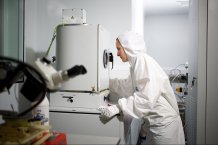Articles

The cash boost will contribute towards funding up to 22 additional PhD studentships.
£1.5 million to train tomorrow’s scientists and engineers
The Government is investing £1.5 million in the University of Exeter, to train the next generation of innovators in physical science subjects.
The cash boost will contribute towards funding up to 22 additional PhD studentships, offering sector-leading training and development alongside Exeter’s outstanding facilities and resources. The studentships will be within the key discipline areas of Physics, Engineering, Mathematics and Computer Science.
The money has come via the Engineering and Physical Sciences Research Council (EPSRC), and is part of a £167 million investment into doctoral training across 40 universities.
Professor Sir Steve Smith, Vice-Chancellor of the University of Exeter, said: “This investment is evidence of the excellence in postgraduate research training at the University of Exeter. We are thrilled to receive this training grant from the EPSRC for the 16th year in a row, and we look forward to the achievements of the new generation of experts that this training will support.”
Science Minister Jo Johnson made the announcement during a visit to the University of Oxford. He said: “This new funding builds on our protection for science spending by supporting research in our world-leading universities and helping to train the science leaders of tomorrow.”
EPSRC’s Chief Executive, Professor Philip Nelson, said: “This year we are allocating £167 million to universities via Doctoral Training Partnerships (DTPs). These will cover a two year period and give institutions greater certainty and increased time to plan their DTP programmes, and support excellent doctoral students.
In addition, we are investing in training and providing capital for research to ensure that the National Quantum Technologies Programme can make the most of the country’s research talents.
These strategic investments will help science push at the boundaries and make discoveries that are taken through into innovations.”
Date: 1 March 2016
